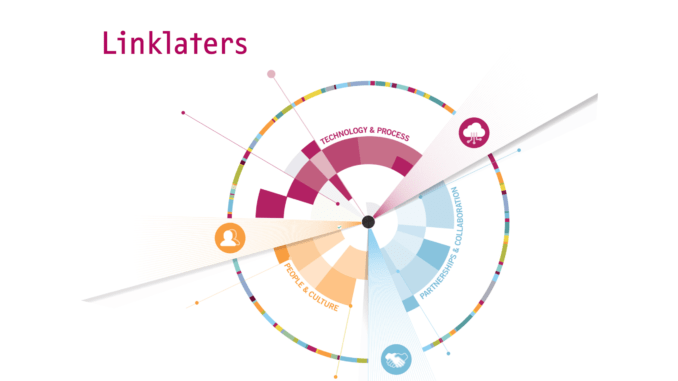
Artificial Lawyer has been asking people in the legal and legal tech community how they are adjusting to the new world of Covid-19-driven working from home (WFH). Here is the view of Shilpa Bhandarkar, Global Head of Innovation at Linklaters. More views from a variety of people will be shared tomorrow and in the following days.
—
Broadly, what do you see as the main pros and cons of WFH?
‘Work is what you do, not where you go’ – so I’ve worked from home / worked remotely, both formally and informally for as long as I can remember.
I tend to do my best creative and strategic thinking when I work from home. The biggest advantage for me, (though this will differ person to person), is access to quiet, uninterrupted spaces to think.
The plural around spaces is important, because I tend to work from different rooms in the house depending on whether I want to spread all my papers out, I need a blank wall for Post-it notes, or I need to sit at a desk and work through emails, although if I’m just ploughing through emails, I usually do that in a café down the road so I get some fresh air and some human interaction too.
There are other advantages like saving time, e.g. no commute, being able to see the family more and just re-charging by being at home.
Two cons:
- You have to invest some time and think about how you work best to make working at home effective – what technology (hardware and software, wifi connection and so on) do you need, what ways of communicating are going to be best – as well as knowing in advance how to use the technology available to you.
- I’ve never done it for long stretches, but I imagine it could get lonely and you would need to actively replace the human interaction that comes naturally in an office setting with virtual substitutes.
What are the other main challenges?
None on the technology side – I’ve previously tested the Linklaters kit and it works really well. It is the same kit that allowed me to split time between Amsterdam and London for the first year in my role.
Our teams have also tested working from home as groups and we know the tech works at scale. We have agreed ways of staying in touch and supporting each other – too early to tell how that will play out, but the fact that we’re all cognisant of it and are talking about it is a positive.
And after technology, there are no other challenges yet, (early days), but what I suspect is going to be challenging as time goes on:
- Co-working from home: This is the first time I’m going to be working from home alongside my partner rather than having the house to myself. He is likely to have his own schedule, will be on his own conference calls and so on.
- Having the children around if schools close / once they break for Easter*.
The same is likely to be true of most of my clients and colleagues, so more generally, the challenge will be around all of us collectively figuring out new routines and ways of working, within our families and with our clients and colleagues.
How long do you think your business could maintain a ‘work from home’ policy?
Previous conversations and experience have largely been around ‘individuals working from home?’. The real question is more around ‘can entire institutions work remotely for the foreseeable future?’
That’s an entirely different proposition and uncharted territory for most of us (companies like Gitlab, Zapier and Buffer have always had fully distributed teams, but are definitely the exception rather than the norm).
From a technical perspective, I think we could work from home / run our business remotely for as long as we would need to. As a global firm, we’ve been seeing the effects of this for a number of months now, (obviously starting in our offices in Asia and then further afield as Covid-19 has impacted on different countries). We have undertaken a great deal of planning to make sure our technology is as robust as it can be, and also to ensure that our people remain connected.
I think the social and emotional aspect of all of us working ‘in isolation’ will likely be the greater challenge – our colleagues in Asia have shared stories about their experiences, and our senior leaders have been communicating with all of us on a very regular basis, giving updates on our approach and what’s going on around the network, and reassuring people.
We’ve seen an increasing incidence of people using their video conferencing capabilities and having team check-ins – little things can make a big difference in making sure a workforce who are not co-located stay connected.
As we move into the uncharted territory of longer-term remote working, I think we will need to keep this kind of connectivity – our own, that of our colleagues and our teams, that of our clients – at the top of our minds.
Thanks for your views.
—
[ * Note: In the UK the Government has not yet demanded that all schools close, although many believe this is inevitable. ]